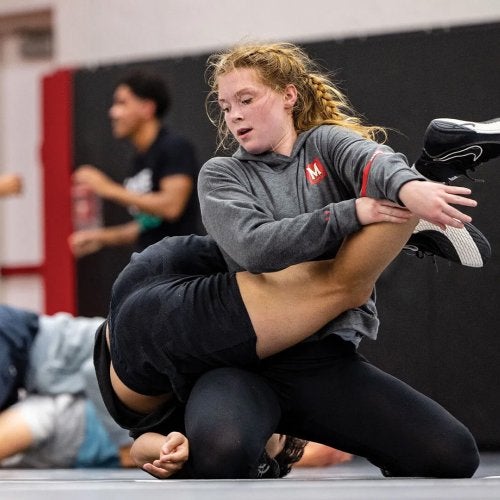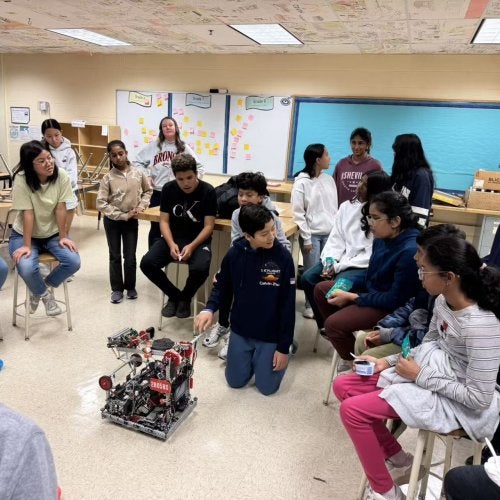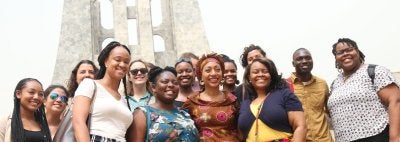

Study Abroad Program Explores Higher Education in the Ghanaian Context
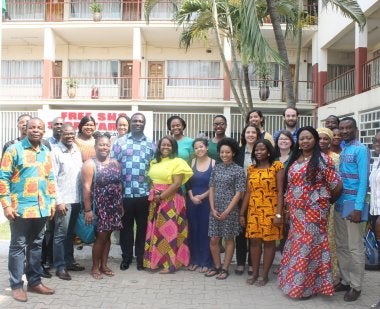
During January 2018, Dr. Candace M. Moore, faculty director of the Higher Education in the Ghanaian Context (HEGC!) study abroad program, with Dr. Jillian A. Martin, co-instructor for HEGC!, led a group of graduate students and higher education staff on a study abroad program to Ghana, West Africa. Through pre-trip class sessions, 11 days in-country experiences, and post-trip classes, the program participants explored Ghanaian higher education, with an emphasis on student affairs’ practices, as well as reexamined issues of social justice and power dynamics through a different cultural lens.
“The HEGC! program is designed to help guide participants’ worldview to expand beyond Western ideals of social justice education and engage participants in a critical examination of concepts related to power, privilege, and oppression through their engagement with Ghanaian culture, the country’s approach to higher education, and especially the role of student affairs and assessment practices in the context of Ghanaian higher education,” Dr. Moore said.
Michael Boakye-Yiadom, Ph.D., is a research fellow at the University of Cape Coast’s Institute for Educational Planning & Administration in Cape Coast, Ghana, and served as a collaborator for the HECG! Program.
“Higher education professionals need preparation in being global professionals and the continent of Africa is a wonderful place to gain new skills and collaborative opportunities. We need to readily promote study abroad programs between the US and Ghana because there is so much to learn... we need to promote higher education collaborations on a global platform,” Dr. Boakye-Yiadom said of the importance of study abroad for higher education programs.
Joakina Stone, a first-year doctoral student in COE’s student affairs program, was drawn to attend the program for both professional and personal reasons.
“Attending this study abroad trip allowed me the opportunity to learn about education in a different cultural context, while also exploring my African identity,” said Stone, who identifies as African American and is the daughter of a Nigerian father and southern African American mother.
“The HEGC! program allowed me to expand my worldview in a changing global society. Much of what is taught about Africa is from a negative perspective. Although I did not and do not buy into all of the negative stereotypes of Africa, it was important for my development as an African American woman and educator to experience Africa, specifically Ghana, for myself,” Stone added.
The group visited with faculty, administrators, and students at four universities (University of Ghana-Legon, Kwame Nkrumah University of Sciences and Technology, University of Cape Coast, and Ashesi University). HEGC! program participants and faculty partnered with student affairs administrators and faculty at the University of Cape Coast to identify and co-construct useful assessment resources and tools in the context of Ghanaian higher education through a project-based experiential learning design. Their engagement and learning while on campus was facilitated by Dr. Boakye-Yiadom.
When asked about future opportunities for growth and development in Ghanaian higher education, Dr. Boakye-Yiadom said that one important focus for Ghana is diversity and inclusion.
“Ghanaian higher education can increase its efforts regarding diversity and inclusion programs, specifically a concentration on the LGBT community. Many of my colleagues think the conversation is too challenging for higher education to address because homosexuality is illegal in Ghana. Yet, we know that we have a responsibility to support, care for, guide, and educate students. I know it took time for the US to progress to where it is today regarding the LGBT community; I’m certain Ghana can advance as well,” Dr. Boakye-Yiadom said.
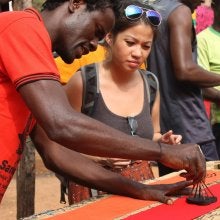
To conclude the trip, attendees met with the Deputy Minister of Education for Ghana, the Hon. Dr. Yaw Osei Adutwum, and the Minister of Education Office directors discussing the positionality of Ghanaian education on all levels (primary, secondary, and tertiary). The group thoroughly enjoyed their discussion and have gained an enriched perspective regarding education in Ghana.
One significant outcome of the trip to Ghana for Stone, who called the trip transformational, was a renewed focus on decentering whiteness in her role as an educator.
“People reared in a Western context are often taught—consciously or subconsciously—that white is the standard and the norm. Doing this places people of color at the margins, while white remains at the center,” Stone said. “While in Ghana, I was reminded that white is not the norm. There are other ways of knowing and being that center various cultures and identities. Although I have often tried to be intentional about bringing the voices from the margin to the center, Ghana was a constant reminder to decenter whiteness. This lesson was one I will carry with me throughout my career.”
The HEGC! 2018 class and its partners at the University of Cape Coast hosted an international symposium on Friday, March 16, 2018, about the program. Dr. Boakye Yiadom joined virtually and served as the featured speaker topically discussing Higher Education in Ghana and the Advancements of Student Affairs Practice. HEGC! participants, faculty, and Dr. Boakye Yiadom are currently working on paper presentations and forthcoming manuscripts related to the program.
Drs. Moore and Martin intend to offer this study abroad course annually and the Maryland Education Abroad website provides details related to the HEGC! 2019 course information.

